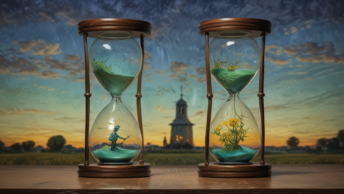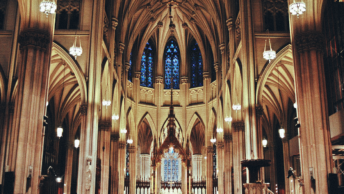We are awash in images and pictures as perhaps never before in human history. Movies, television, and the Internet have given us pictures and images in a dazzling array unknown to the generations that have preceded us here on this earth.
In this context, the Church has amongst us catechumens and candidates who have been preparing themselves for their Easter initiation into our Catholic family of faith. It leads me in the scrutinies of this Fourth Sunday of Lent to ask the question: Do we see what they see or do we only think we see what they see? Today’s Gospel account (Jn 9:1-41) ought to cause us to question ourselves, to give ourselves a spiritual checkup.
There’s an old proverb that tells us “there are none so blind as those who think they see.” Blindness ought to concern us, particularly those among us who were baptized when we were infants and who grew up in our formative years attending religious education classes in our local parishes.
I’m sure we all recognize the account we’ve just heard about the man born blind is not simply an account of physical blindness and the recovery of eyesight. The real cure has to do with spiritual blindness – something that ought to concern all of us.
The truth is that we don’t see at all well when it comes to both seeing God and seeing other people. Beyond that there is the matter of seeing the deeper realities hidden within the people and events that we encounter during our lives here on earth.
Today’s Gospel reading is about blindness. It causes me to suggest that you and I need to look at the answers to some important questions — What are we looking at? What should we be looking at? What are we looking at that we should not be looking at?
What are we looking at?
Each and every day there are so many things that clamor for our attention. Many times some of those are so stressful that, in order to escape, we give our attention to things that are distracting, trivial, unimportant, or merely entertaining. It’s a sort of voluntary blindness; it’s a form of escapism, of denial. When we go on the Internet, what sites do we visit and how often? Cell phoning and texting are likewise useful to keep us from looking at what is truly more important.
What are we looking at that we should not be looking at?
More and more people are compulsively addicted to viewing pornographic Internet sites. Others spend an inordinate amount of time checking stock market information. Some of us are news addicts. The same holds true for what we watch on television. How often do we watch TV in order to escape?
What should we be looking at?
Our relationships with our families: Many of us have not given serious attention to their relationships with their husbands, their wives, and their children. Neglecting serious examinations of them leads to family miseries. We need to give our relationships our close attention.
The most important thing we need to look at is our relationship with God. It goes without saying that a lot of unhappiness is found in the lives of those who simply set God aside. They think they will get around to paying attention to God “later”… and later never comes around, often until it’s too late. We need to look at the “now” in our relationship with God.
An important vision connected to this has to do with how we see ourselves. All too often people make snap judgments, superficial judgments about what God is doing in their lives. At a shallow level they simply assume they know what God’s doing. They come false assessments of what God is doing because they have not seriously prayed over the matter; they have not made a discernment based on some contemplation and meditation that gives them a vision of God and His works throughout both human history and what He has been doing throughout their lives.
The secret to having good insight, inner sight, inner vision, is found in prayer, in spending time with God trying to see things as He sees them. If you take this route you will have, as have I, some wonderful surprises. You’ll begin to see beauty in others, a beauty that others and we ourselves often miss because we have eyes to see but don’t really see. In spending some quiet time alone with God you will see God’s gifts in your life.
St. John’s Gospel is filled with references to light and darkness, blindness and vision, seeing and not seeing. The old proverb: “None are so blind as those who refuse to see,” comes to mind. We might add: “None are so blind as those who are too busy to see.”
Lent is now half over. The good news is that half of Lent lies in front of us, giving us, in God’s good graces, more chances to utilize the time remaining in paying attention to what we see and don’t see, and what we ought to take a look at.
Brothers and sisters:
You were once darkness,
but now you are light in the Lord.
Live as children of light,
for light produces every kind of goodness
and righteousness and truth.
Try to learn what is pleasing to the Lord.
Take no part in the fruitless works of darkness;
rather expose them, for it is shameful even to mention
the things done by them in secret;
but everything exposed by the light becomes visible,
for everything that becomes visible is light.
Therefore, it says:
“Awake, O sleeper,
and arise from the dead,
and Christ will give you light.”








